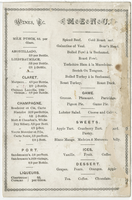Search the Special Collections and Archives Portal
Search Results
Dill, David Bruce, 1891-
David Bruce Dill was a physiologist in the study of exercise, sports medicine and applied sciences. His research focused on the effects of temperature exposure, high-altitudes, diet, age and fatigue on the human body. Dill received his bachelor's degree from Occidental College in Los Angeles, California and both his master's and doctoral degrees from Stanford University in Stanford, California. He began his physiology career at Harvard’s Fatigue Laboratory in its inaugural year, 1927.
Person
Hecht, Chic, 1928-2006
Nevada businessman and Republican politician Jacob "Chic" Hecht (1928-2006) was elected to the U.S. Senate in November 1982. As a senator, he used quiet diplomacy skills to help Soviet Jews gain permission to emigrate. During the Korean War, Hecht served as a counterintelligence agent in Berlin. After the war he moved to Las Vegas, Nevada and operated several businesses. Hecht also represented Clark County in the Nevada State Senate for eight years.
Person
McMillan, James B., 1917-1999
Civil rights leader James B. McMillan was born in 1917 in Aberdeen, Mississippi and moved to Michigan in 1931 with his family. He finished his high school education in Hamtramck, Michigan where he was the first African-American captain of the football and track teams. In 1936, he opted to enroll at the University of Detroit rather than the segregated University of Michigan. After graduation, he moved to Nashville, Tennessee to attend Meharry Medical College School of Dentistry.
Person
University of Nevada, Las Vegas Faculty Publications
Identifier
Abstract
The University of Nevada, Las Vegas (UNLV) Faculty Publications (1950-2008) is comprised of reports, scholarly journal articles, and books that were written by UNLV faculty and staff. Publications also include book reviews and conference presentations. Subjects include biology, chemistry, English, and sociology.
Archival Collection
Jeff Ju oral history interview
Identifier
Abstract
Oral history interview with Jeff Ju conducted by Jennifer Sui on November 17, 2021 for the Reflections: The Las Vegas Asian American and Pacific Islander Oral History Project. In this interview, Ju recalls moving to the United States with his family at the age of ten. He discusses his relationships with his parents, how it has changed, and experiencing discrimination and racism at work and as an individual. While he lives in New York, Ju visits Las Vegas, Nevada regularly and shares how he finds it more inclusive and welcoming compared to New York or Korea.
Archival Collection
Alma Hinds oral history interview
Identifier
Abstract
Oral history interview with Alma Hinds conducted by Kyle Baluyut in November 2021 for the Reflections: The Las Vegas Asian American and Pacific Islander Oral History Project. In this interview, Hinds recalls her journey to the United States after marrying a U.S. naval officer stationed in the Philippines. Hinds describes her experiences settling into Las Vegas, Nevada, her second marriage, and joining a local Filipino/Hawaiaan dance group.
Archival Collection
Louis Baluyut oral history interview
Identifier
Abstract
Oral history interview with Louis Baluyut conducted by Kyle Baluyut in November 2021 for the Reflections: The Las Vegas Asian American and Pacific Islander Oral History Project. In this interview, Baluyut discusses his early life in the Philippines, immigrating to the United States by enlisting in the U.S. Navy. He recalls his experiences travelling around the country and internationally, and how life in other places compares to Las Vegas, Nevada.
Archival Collection
Ava Carino oral history interview
Identifier
Abstract
Oral history interview with Ava Carino conducted by Isabelle Rice on November 20, 2021 for the Reflections: The Las Vegas Asian American and Pacific Islander Oral History Project. In this interview, Carino recalls their experience as a Filipino American growing up in Las Vegas, Nevada. They discuss working in the gaming industry, past traumatic experiences, and their family's immigration story. Please note the following disclaimer: This interview contains language or content that some may find offensive or triggering. Please contact special.collections@unlv.edu for further information.
Archival Collection

